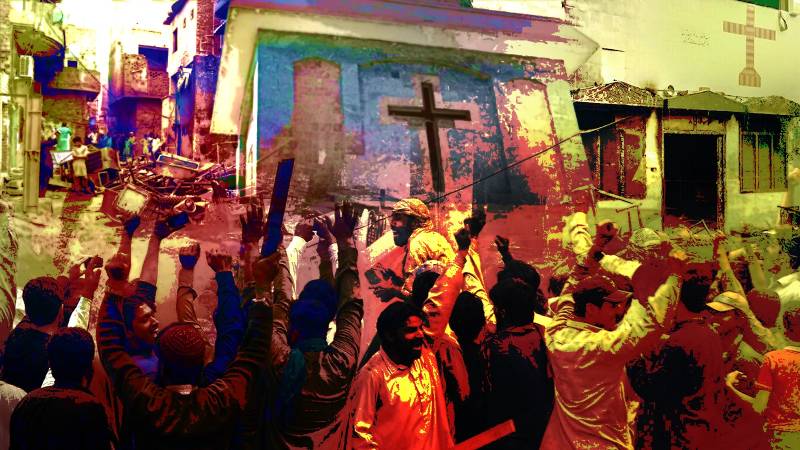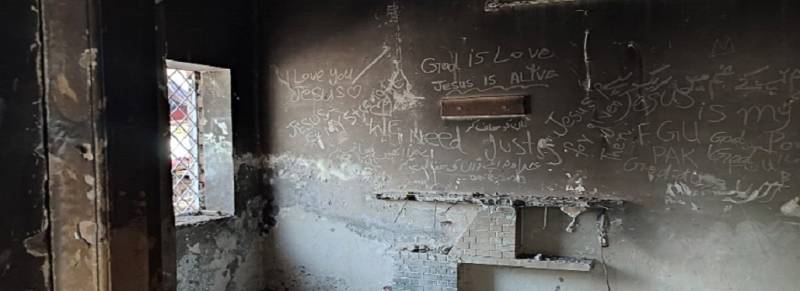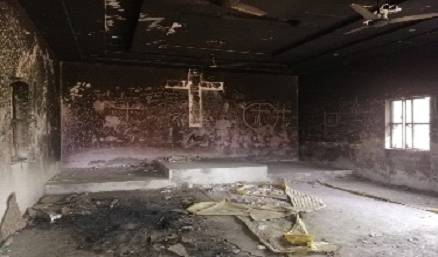
On August 16, 2023, just days after celebrating Independence Day, the Christian community in the Jaranwala area of Faisalabad saw their world turn upside down when angry mobs rampaged through their community, torching Churches, houses, and even holy books.
Residents of the community had to flee before the crack of dawn, hiding in fields and with relatives who lived in neighbouring districts. Back home, mobs ransacked and looted with complete impunity.
After some spent the night under the open sky and it was deemed safe enough to return, they saw only destruction waiting for them. Houses were looted, and possessions they had saved for months to purchase were either badly damaged, burnt or simply stolen.
As they sat outside their still smouldering homes weeping, all they could do was wonder why such an incident took place and with them of all people.
"Whose responsibility is it to protect the lives, religious objects, and property of indigenous Christians and citizens of Pakistan?" they asked.
Homes, which were once full of life now lay eerily silent and devoid of human presence. Confusion races in the eyes of the children, their mothers clueless on how to restore peace in their lives, to assure them home is a place where they are safe.
A picture of a young boy in his national dress trying to comfort his weeping mother shook the world.
I visited the Christian community for field research on the incident. I sat with the grieving Christians in Jaranwala and surrounding villages and spoke to the leaders and pastors.
The first step was to share peace and understand the intensity of their loss and pain.
It was heartbreaking to look at the Pakistani flags on the roofs of one of the burnt homes, while people were shocked and at a loss to understand what their citizenship and national identity practically meant.
Christians and Pakistan
Historically, Christians have contributed greatly to the area we today call Pakistan. Christian missionaries built and run some of Pakistan's best educational, medical, and social support organisations.
When a Christian refugee from Iraq, Salwan Momika, torched a copy of the Holy Quran in Sweden on Eidul Adha on June 28, 2023, sparking widespread condemnation from the Muslim world, the Christian community in Pakistan stood with the majority of Muslims in condemning it, adding that such acts cannot be justified.
Church leaders in Pakistan called upon the authorities to protect Christians and places of worship. Almost every Christian leader pasted fliers on the walls of their Churches, while pastors wrote letters condemning the desecration of the Holy Quran and expressed their solidarity with the Muslims in Pakistan and across the globe.
Christians not only shared solidarity with Pakistani co-religionists but also passed the message that they are Pakistanis and should be protected as citizens of Pakistan.
In this regard, they celebrated a speech by the nation's founder, Quaid-e-Azam Muhammad Ali Jinnah, to the constituent assembly of Pakistan on August 11, 1947, which categorically stated that minorities in Pakistan would be free to practice their religion. The day is officially observed as Minorities Day.

With such assurance of protection, they call themselves the "people of Muahid", whose right to worship was guaranteed and whose places of worship were promised protection in Pakistan. Christians and Muslims celebrated Pakistan Independence Day on August 14.
Christians joyfully remembered how they also sacrificed to build Pakistan. Prayers were offered in Churches for peace to prevail in Pakistan. Many Christian boys and girls dressed in special green and white ensembles to share their love for their beloved country.
But unbeknownst to them, these joyous scenes soon turned into grief and anguish.
What happened on August 16?
On August 16, the Jaranwala police registered a complaint against two Christians for allegedly desecrating the Holy Quran with their pictures and phone numbers plastered on the pages.
As news of this desecration spread, announcements were made from the local mosque, inciting people to take to the streets and to 'avenge' the alleged blasphemy.
The mob was ready to protest without proper investigation or legal prosecution of the accused.
Mian Habib, who recorded the incidents which took place that day, said that from 8 am to 9 pm, Jaranwala and its surrounding villages were at the mercy of violent mobs who appeared to be bent on destroying any and every public representation of the Christian community in the area.
The mob broke into Churches, burning and damaging 26 Church buildings, and approximately 80 homes belonging to Christians and some Muslims were burnt, looted and property damaged.
It was sad to see that the mobs also attacked two schools. One of the schools was badly burnt and damaged, causing fear and uncertainty in children's hearts.
Many had lost their households. We found some pastors whose houses were completely burnt, or their property was left damaged and broken. The pastors sat in the open, in front of their burnt churches and houses, holding small services for their congregations.
A Christian graveyard in the area was also attacked. The graveyard wall was damaged, while crosses and epitaphs of graves were desecrated.
Jaranwala’s Christian Assistant Commissioner Shaukat Masih was attacked, and his office was ransacked. He was removed from his position on the day of the attack, which raised a concern that the freedom minorities have to serve the country faces serious threats.
Legal implications
The provincial government moved swiftly to arrest and book scores of people involved in the incidents of August 16.
Members of the mob not only committed serious crimes such as arson and destruction of property, but they went further with crimes such as robbery.
Most of the community members forgot that burning holy scriptures such as the Bible, Psalms (Zaboor), and other sacred literature also constitutes a crime under Sections 295-A and that Section 298 of the Pakistan Penal Code (PPC) punishes certain acts conducted with the deliberate and malicious intention of wounding the religious feelings of any person.
Most people have forgotten the legal status of waqf properties consecrated places of worship. Section 295 of the PPC makes punishable acts of destruction, damage, or defilement committed by anyone, even if the person is a worshiper of the sacred place which they have defiled.
This law not only protects Mosques but Churches, Temples, and any other sacred place of worship and objects. The law protects the property and its surroundings from damage or theft.
Moreover, the mob broke the locks on churches and residential quarters, thus constituting unauthorised entrance to these structures as breaking and entering. Buring it, destroying property and looting all constitute crimes severally.

The damage done to graveyards and graves is also a crime. Section 297 of the PPC prescribes punishment for "a person who commits trespass in any place of burial, any place set apart for the performance of funeral rites or a depository for the remains of the dead, offends any dignity of any human corpse or causes disturbance to any person assembled for the performance of funeral ceremonies."
Jaranwala’s Christian Assistant Commissioner Shaukat Masih was attacked, and his office was also damaged. Since he is a government official, such acts carry additional legal clauses.
However, the law was neglected and broken with impunity, with Christians, both dead and alive, dishonoured in the violent incidents of Jaranwala on August 16.
But with the judicial process powerless to make people aware that they are breaking laws and mobs taking the law into their hands, the Christian community is confused about how justice can be obtained.
Impact on Christian community
The Christian community is confused. They raised concerns for their freedom, dignity, rights, and security and whether they will ever get access to justice.
The Christian community fled their neighbourhood and took every means of escape. Some even ran away on foot to escape the wrath of a mob before dawn on August 16. Many took refuge in fields and slept under the open sky, completely exposed to the elements and their assailants. Later, they returned to see their homes and their lives either badly damaged, burnt or stolen, have left them broken.
For them, every glance towards the charred remains of what was once their life is another moment to mourn and ask why such incidents keep happening.
Despite surviving such a harrowing incident, the Christian community is not up in arms in protest.
They continue to display patience and hold on to peace.
The walls of Churches are inscribed with comments such as ‘God is love’, ‘God, forgive them’, ‘We will suffer’, ‘How long?’, ‘Am I Pakistani?’, ‘Pakistan is my country’, ‘freedom’, etc.
They take solace in their scripture and turn the proverbial cheek.
It was encouraging to learn of their positive reply to negative comments written by those who came to set Churches on fire.
But this does not mean that the entire Christian community has decided to collectively forget what has happened over the years.
They pointed to cases which have occurred since 1986, such as Shanti Nagar, Sangla Hill, Sialkot, Gojra, Corian, Joseph Colony, and many other places and incidents.
While many may condemn incidents such as Jaranwala, no long-term solution is offered to effectively protect minorities in Pakistan.
While Christians are truly grateful to find that six churches were indeed protected from significant harm by the local Christian-Muslim community, non-Muslim Pakistanis in the general socio-political context continue to suffer from discrimination in numerous ways, with Christians sadly paying a high price in the face of continuing trumped-up allegations of blasphemy.
They pointed out how religious accusations (no matter whether true or false) are used as a hook to grab property, land, or position occupied by Christians.
Muslim-Christian reaction
Jaranwalla was one of the most critical incidents in Pakistan's history.
Legislation to conduct a neutral survey of Pakistan's historical offences laws remains inactive in Chapter 15 of the PPC.
This provides legal protection for places of worship and objects, religious assemblies (295), and consecrated burial places/burial rights (297), while freedom to discuss religious opinions calmly (298) was protected in pre-1980s Pakistan.
However, while banning offensive speech/publication (295-A), Christians lost legal battles to win respect and dignity as citizens of Pakistan. The law has remained powerless, as witnessed in hundreds of other incidents in post-1980s Pakistan.
Muslim support
Various Muslim ulema and Muslim community members have condemned the misuse of the law and have stood with the victims of Jaranwala.
Maulana Tahir Ashrafi, who heads the Pakistan Ulema Council, said, "The incident is not an attack on Christians but it is an attack on Pakistanis," he further expressed grief by saying, "The attackers have shamed us for which I apologize to the Christians of all over the world including Pakistan." (August 20, 2023, the National Newspaper). Such a step should not have come just from a few members but from the Muslim community as a whole. Sadly, condemnation of such extremist reaction is not universal, and Christians are left to defend themselves as best they can.
Appeal
Please consider how far the law and practice of freedom of speech is being implemented. The Church and homes of Christians in Pakistan are on fire, and the tears of thousands of Christians flow without any violent protest or reaction in Pakistan. This raises a serious concern about how far insensitive demonstrations in the West for freedom of expression have any effective consequences for life and death in Pakistan.

